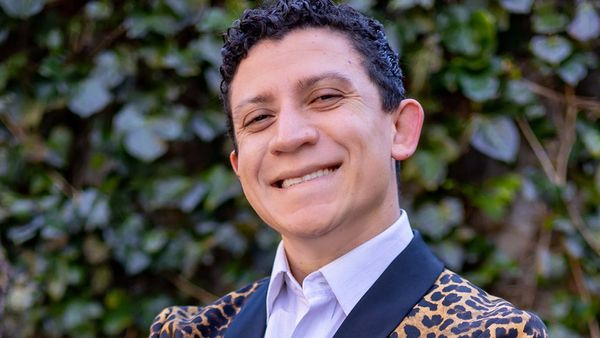
Sep 28
After 20 Years and a Move to Berlin, Xiu Xiu is Still Making Music for Outsiders
Krysta Fauria READ TIME: 3 MIN.
Since its inception more than two decades ago, the experimental rock band Xiu Xiu has danced between extremes. They've made music – drenched in synthesizers, breathy vocals and distorted guitar – that is somehow both cacophonous and beautiful, frightening yet poignant, avant-garde yet (mostly) melodic.
In other words, Xiu Xiu's music can't be placed neatly into a box, something the band's leader, Jamie Stewart, knows a thing or two about.
"I don't say this in a self-aggrandizing way, but I am a very weird person," Stewart said. "I wish I wasn't. It's not fun operating in the world in a way that doesn't really fit."
As the prolific band gears up to release their 18th LP, out Friday, Stewart recognizes the ways in which these feelings of otherness have been meaningful for their art and their audience.
"Xiu Xiu is certainly not for everybody. But it is for very specific people, generally for people who are, in one way or another, kind of on the edge of some aspect of life," Stewart said. "That's the group of people that we are and that is the group of people for whom we are trying to make records."
But even as they've stayed weird, Stewart admits there was a shift on "13'' Frank Beltrame Italian Stiletto with Bison Horn Grips" – a reference to one of Stewart's switchblades that served as a kind of "talismanic item" during the recording process.
"Almost every single track is set up in the very traditional way that Western folk songs are organized – as a bridge, as a verse, as a chorus. So, in that way, because it's a style of organizing music that people in the Western world have been aware of for 200 years, it is probably accessible," they said. "It seems to happen with every record we have ever done where somebody says, 'It's their most accessible record,' which sort of implies to a lot of people that our records must therefore be inaccessible."
But that accessibility is varied, from the anthemic, easy-listen lead single, "Common Loon," to "Piña, Coconut & Cherry," the record's final song that culminates with Stewart belting bloodcurdling screams about a love that makes them insane.
That variation is a reflection of the types of artists Stewart loves, which ranges from Prince and folk musicians to people who make the most "difficult music that has ever been recorded."
The band currently comprises Stewart – the sole remaining founding member – along with David Kendrick and Angela Seo, who joined in 2009. Seo says collaborating with any creative partner for 15 years takes work but that her respect for Stewart's vision and creativity serve as a kind of anchor to keep them together, even when they fight over Stewart being "super picky" about every detail in the studio and on stage.
"I think it's frustrating, but ultimately we both are like, 'Yeah, that's the goal.' The goal is just to make this the best show possible. And that kind of helps us stick with it," Seo said.
After living as roommates in Los Angeles for a decade, Seo and Stewart moved to Berlin together through an artist residency program that helped them get visas and paid for their housing during their first few months there. And while living in Berlin has been more practical and financially sustainable, Stewart said it's been a bigger adjustment than expected.
"It's a little boring," Stewart admitted. "It's much safer. I'm much, much, much less stressed out. I don't have to have a car, which is great. If I have a major health problem, it's going to be totally fine. Those things are great. The adult parts are great."
"Horn Grips" is the band's first album since their move to Berlin, and that change of scenery has inevitably informed the album's sound. How it does so in future albums is something Stewart is thinking about.
"I've been struggling with that a little bit and am just realizing that my external environment for a long time was a big point of inspiration," Stewart said. "I don't feel like my creativity is stifled, but it is going through a period of needing to adjust, which is a good thing."







